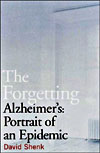
Comment
on this story
David Shenk will talk about his book in a University Studies Presentation Tuesday, June 4, at 7 p.m. in the Lindsay Young Auditorium, Room 101, Hodges Library, at The University of Tennessee. He will also speak at the Eighteenth Annual Alzheimer's Disease Symposium June 4 at the Park Vista Hotel, Gatlinburg.
|
 |

Writers explore the insidious insinuation of Alzheimer's disease
by Jeanne McDonald
No woman could have been more brilliant or better educated than Iris Murdoch, the noted British novelist and philosopher who died in 1999 at the age of 79. Although her illness was reported in 1995, her highly publicized struggle with Alzheimer's disease had begun insidiously almost 15 years earlier, insinuating itself into her cerebral cortex, the thin layer of gray matter coating the inside of the brain, clouding it with cellular debris and choking neurons from inside their cell membranes. Even while she was still lecturing and writing, her brain was losing bits of memory, erasing priceless fragments of thought and experience.
Murdoch's horrifying descent into oblivion is recorded by John Bayley, her husband of 43 years, in Elegy for Iris (St. Martin's, $22.95), a memoir valuable not only for its record of Murdoch's relentless illness, but also for the light it shines on the role of Alzheimer's caretakers. Bayley  fell in love with Iris Murdoch one rainy day in Oxford, England, as she bicycled past his window. "She had no girlish attractions," writes Bayley. "It was my naive and now inexplicable assumption that she could appeal only to me, and to no one else, that stopped me seeing how fearfully, how almost diabolically attractive everyone else found her." fell in love with Iris Murdoch one rainy day in Oxford, England, as she bicycled past his window. "She had no girlish attractions," writes Bayley. "It was my naive and now inexplicable assumption that she could appeal only to me, and to no one else, that stopped me seeing how fearfully, how almost diabolically attractive everyone else found her."
"Everyone" included women as well as men, but Bayley persisted, and three years later, the two were married. Yet, when illness changed his wife from an independent scholar to a pitiable creature who followed him from room to room, mewling, Bayley was able to rationalize his loss. "This new marriage has designed itself...to bring an end to her fearful anxieties of apartness—that happy apartness which marriage had once taken wholly for granted."
Even in the final four years of her life, while Murdoch moved further into what she initially described as a "very, very, bad, quiet place," she occasionally had "flashes of lucidity" that resembled momentary steps back into the world of reality. To her friend Peter Conradi, she confessed not once, but twice, that she was "sailing into the darkness," proving that her brain, which showed dead areas on the brain scans, was still capable of concocting imagistic metaphors. In the worst of times, she made "mouse noises," exhibited extreme agitation involving weeping and badgering, resisted bathing and undressing, and spent long hours watching television, especially the Teletubbies. "When are we leaving?" she asked her husband constantly, often when already traveling on a train. She collected odd objects—stones, twigs, dead worms, dry leaves, shoes and papers found in the street, and was adamant that they be saved; thus, this "rubbish" collected in corners and on tables and shelves, covering over with film and dust and contributing to their cottage's incipient odor of neglect and despair. And daily, Murdoch compulsively watered to overflowing Bayley's beloved plants, causing their deaths by drowning.
This lost soul was the brilliant academician who had written 26 novels and treatises on complicated subjects like French existentialism or metaphysics as a guide to morals. This was a Dame of the British Empire, a Foreign Honorary Member of the American Academy of Arts and Sciences, a recipient of the Booker McConnell Prize and countless other honors.
In the Tucson Weekly, Randall Holdridge cruelly calls Bayley's account of Murdoch's long slide into darkness "whiny," adding, "This is, of course, the time of the intimate memoir, when as an act of personal purging writers with nothing more to say, but an irresistible urge to say something, pour out their long suppressed tales of family abuse and disillusionment, of hurts newly remembered as fashionably marketable narratives." Shame on Holdridge. His assessment is patently unfair, especially considering that Bayley had been entrusted with the tedious care of a woman who looked like his wife but had lost her inner core, her very Irisness. Bayley's account is important for the very fact that Murdoch was a respected figure who consequently has become a highly identifiable poster child for a disease that is sweeping the globe.
Fortunately, there is now an excellent study, The Forgetting: Alzheimer's: Portrait of an Epidemic (Doubleday, $24.95) by David Shenk, that explains to the layman this "death by a thousand subtractions." It is a frightening but imperative read, because presently, about five million Americans suffer from Alzheimer's, and in 2011, when the first of the baby boomers turn 65 and new technology has extended life expectancy even further, about 15 million people in the United States alone will, as Shenk terms it, begin "unraveling." Ordinarily, every time a memory is  recalled, new trails are made through the circuitry of the brain; thus, the very act of remembering generates new memories. But Alzheimer's victims are pulled deeper and deeper into the world of "now," where each experience is viewed as new and the patient is unable to connect it to anything in the past. recalled, new trails are made through the circuitry of the brain; thus, the very act of remembering generates new memories. But Alzheimer's victims are pulled deeper and deeper into the world of "now," where each experience is viewed as new and the patient is unable to connect it to anything in the past.
Ronald Reagan's illness began to exhibit itself in the final years of his presidency, although it was not officially announced until a year after he left office. Both his mother and brother had also suffered from Alzheimer's, strengthening the argument that an inherited gene might pass the illness along. Ralph Waldo Emerson, who had always been fascinated by the ways in which memory shaped human consciousness, called it "...the cement...in which the other faculties are embedded...without it all life and thought were an unrelated succession." But this brilliant essayist, who could recite most of Milton and Wordsworth by heart, was so debilitated by Alzheimer's that when, shortly before his death, an admirer asked him to autograph a book, Emerson could not recall his own name and implored the man to write it out for him. When the man complied, Emerson copied the name and date laboriously and then, only minutes later, asked the same man if he would like him to sign his book.
Although Alzheimer's patients cannot recall exactly what has happened to them, they seem to realize that they are stuck in a horrific place from which they can never return. No wonder, then, that Iris Murdoch's plaintive cry becomes a mantra for all victims: "When are we leaving?"

May 30, 2002 * Vol. 12, No. 22
© 2002 Metro Pulse
|